
June 8
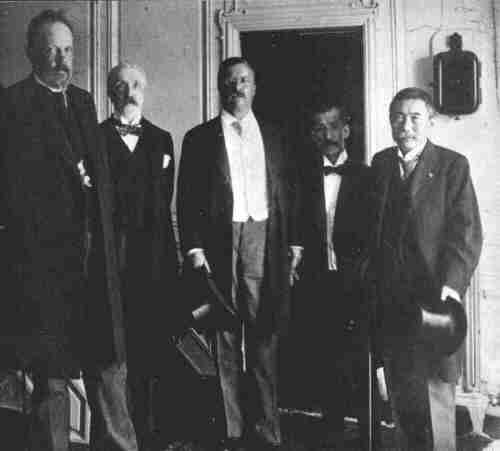
1905 Russo-Japanese War: United States President Theodore Roosevelt offers to broker peace negotiations between Russia and Japan. Both sides will agree on June 10. (Jukes, LaFeber)
From Hirohito: The War Years by Paul Manning:Both the Japanese army and the Emperor regarded with pride their remarkable military defeat of Russia in 1905; it had brought honor and prestige to the nation and to the Emperor. But it was this victory that, in a historical perspective, really started Japan on the road to war with the United States a decade later. The attack on the Russian Asiatic Fleet at Port Arthur in 1905 was made without warning, a prologue to the attack to be made 36 years later at Pearl Harbor. Emperor Meiji, Hirohito's grandfather, sent his torpedo boats in a surprise attack. The ships they did not sink were bottled up inside the harbor, and two days later Meiji issued his Rescript declaring war on Russia. He accused Russia of threatening Japan's plans for expansion. (Similarly, in Hirohito's Imperial Rescript declaring war on the United States two days after the 1941 Pearl Harbor attack, he blamed the United States and China for imperiling the existence of the Japanese Empire.) . . . .
After nine months of war, both Japan and Russia were looking for peace. President Theodore Roosevelt offered to mediate, and peace terms were arranged. Korea was given to Japan, as was Port Arthur, the Kwantung Peninsula, and all railroad rights in southern Manchuria. Because there were no war reparations to be paid by Russia, which the Japanese people had been expecting—they had put up with many privations to support this war—there were riots in all major industrial Japanese cities. Calm descended after Emperor Meiji assured his people that the benefits to Japan would, in time, be immense. "This was only the first step in the building of a vast Japanese Empire," he declared.
Lieutenant Douglas MacArthur and his father, Major General Arthur MacArthur, were US Army observers of this war. When they returned by way of Tokyo, both observed that "the future and very existence of America is irrevocably intertwined with Asia and its island outposts." General Arthur MacArthur also made the observation that Japan's imperialistic ambitions posed "the central problem of the Pacific."
1915 World War I: Various:

List Regiment: Gefreiter Adolf Hitler's 16 Reserve Infantry Regiment continue to occupy a position at Fromelles—pictured above in a drawing by Hitler—which is on a level field with water channels, willow trees and willow stalks. In the distance towards the enemy lines lies an insignificant wood with barbed wire entanglements. Under the direction of their defense-minded commander, Lieutenant General Gustav Scanzoni von Lichtenfels, the regiment works ceaselessly day and night to further fortify their position at Fromelles while fighting off repeated assaults by the enemy. [For further details, Click here.]
Lusitania:

Secretary of State William Jennings Bryan resigns on the grounds that as a pacifist he cannot sign a strongly worded second Lusitania note to the Germans that has been written by President Wilson and other members of the Cabinet. Bryan says "a ship carrying contraband should not rely upon passengers to protect her from attack — it would be like putting women and children in front of the army." (THP)
1916 World War I: List Regiment: Gefreiter Adolf Hitler continues to endure trench warfare in Flanders (Artois) with 3 Company, 16 Reserve Infantry Regiment. [For further details, Click here.]
1917 World War I: Various:
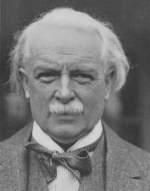
British War Cabinet:
On this day in 1917, early in the fourth summer of World War I, British Prime Minister David Lloyd George calls an emergency meeting of his War Cabinet in London to discuss plans for an upcoming British offensive against the Germans on the Western Front.
With Russia wracked by revolution and mutinies spreading within the French army after the disastrous Nivelle Offensive in the spring of 1917, the British planned their own offensive, led by General Douglas Haig, to begin that June 10. One prominent member of the cabinet, South African Defense Minister Jan Smuts, had been advocating the earliest possible launch of the offensive, arguing that to delay would mean the Germans would "have time to recover their spirits. If we could not break the enemy s front we might break his heart."
At the War Cabinet meeting on June 8, Lloyd George and his ministers heard Smuts' argument; the prime minister, however, proposed that the offensive be postponed, and that Britain consider "the possibility of a separate peace with Austria," the purpose of which would be to isolate Germany and put pressure on the Kaiser to end the war. Why should Britain alone seek to bear the entire burden of the war, Lloyd George reasoned, when "the French were finding it difficult to go on, and their reserves physically and mentally exhausted?"
Smuts urged his colleagues to consult Haig, then in the field, on the viability of the offensive. When the general expressed a vague hopefulness, he was summoned to London to explain in detail his outlook. Arriving on June 19, Haig explained to Lloyd George and other skeptics his belief that Germany was on the verge of exhaustion and that with one more massive push, the Allies could win the war within the year. Lloyd George gave in, and the British offensive—later known as the Third Battle of Ypres—was scheduled for the final day of July. (History.com)
List Regiment: Gefreiter Adolf Hitler's 16th RIR remain east of Douai for a period of rest that will extend until June 24. [For further details, Click here.]
1918 World War I: List Regiment: The 16th RIR continue to hold the front at the Aisne and the Marne. [For further details, Click here.]
1933 Holocaust: The first plenary session of the Central Fund for German Jewry opens in Jerusalem. (THP)
1937 Spanish Civil War (June 8-9): Air raids on Madrid, Barcelona, Bilbao, and Valencia cause heavy damage and loss of life.
1940 World War II: Various:
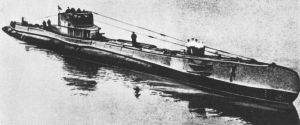
Loss of Polish submarine Orzel with six officers and forty-nine seamen:
Orzel was not heard from after 23 May, and was lost sometime between 24 May and 8 June. No Allied submarine was attacked during these days by either surface ships or U-boats. The wreck of Orzel has never been found, but will still be lying somewhere on the bed of the North Sea. Orzel holds a special place in the hearts of the Poles, who will never forget her.

Aircraft carrier HMS Glorious (above) is sunk with the loss of 94 officers and 1,380 ratings, besides 41 R.A.F. personnel, while evacuating British troops from Norway.
German Foreign Office to Representative with Reich Protector of Bohemia and Moravia:
In view of German-Soviet relations, it appears advisable to avoid anything which would be likely to arouse the Soviet Government's distrust in the Ukrainian question. Accordingly, the Foreign Office attaches importance to having the Ukrainian organizations in Greater Germany carry on no political activities. This also applies to former Hetman Skoropadsky and his movement. The importance of the Hetman Movement has declined lately, to be sure, in favor of the Ukrainian National Organization (UNO), which was promoted by the competent German internal authorities, but even now the Hetman still has numerous adherents at his disposition outside Germany, especially in the United States and Canada, where several thousand Ukrainians have pledged their oath of allegiance to him and recognize his family as the hereditary dynasty.
The Foreign Office and the Gestapo are continuously in contact with the Hetman, who has always maintained a loyal attitude toward Germany. To assure him and his family an income consistent with his position, a considerable allowance is paid to him regularly by the Foreign Office in addition to the monthly honorarium provided by the late Reich President Field Marshal von Hindenburg in 1928. Unfortunately relations with him have for some time been deteriorating, because the 73-year-old Hetman evidently considers it his main duty to attack and cast suspicion on the other Ukrainian groups, especially the above-mentioned UN0.
1941 World War II: Allies invade Syria and Lebanon:
On this day in 1941, British and Free French forces enter Syria and Lebanon in Operation Exporter.
In May, the pro-Axis Rashid Ali rose to power in Iraq and refused to allow British maneuvers within his country in accordance with the Anglo-Iraqi Treaty of 1930. Britain quickly restored the status quo ante by driving Ali and his followers out of Iraq. And to ensure that German military supplies shipped to Ali via Syria did not result in Axis control of that country and neighboring Lebanon, Britain decided to take preventive action. With Australian and Indian support, as well as that of Free French forces, Britain invaded both Syria and Lebanon, fighting Vichy French garrisons loyal to Germany. Resistance lasted five weeks before an armistice was finally signed on July 14, giving the Allies control of both Syria and Lebanon. Among those wounded in the fighting was the 26-year-old leader of [Jewish] volunteer forces, Moshe Dayan, the future hero in the fight for an independent Jewish state. He lost an eye. (History.com)
1942 World War II: War with Japan: Japanese imperial submarines I-21 and I-24 shell the Australian cities of Sydney and Newcastle.
1943 World War II: Ultra/Magic: This day's 'Magic' summaries, detailing intelligence decrypts of Japanese and German coded traffic, contains an intercepted message from Major General Okamoto from Berlin to Tokyo warning that the peculiarities of Allied strategy prevents him from judging with "anything like precision where England and America will concentrate their activities. Will it be in the East or in the West — who knows? . . . . . In Europe the enemy's policy will probably be to use every possible means to keep the Russians battering the Germans . . . . . Simultaneously they will be scheming to surround Germany and Italy. All the while they will be using every trick conceivable to cause Italy to desert Germany and Japan."
1944 World War II: Various:
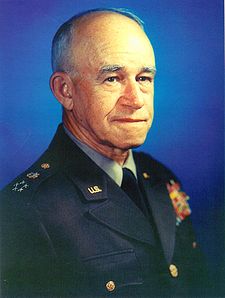
British and American troops meet up in Normandy:
U.S. General Omar Bradley, following orders from General Eisenhower, links up American troops from Omaha Beach with British troops from Gold Beach at Colleville-sur-Mer. Meanwhile, Russian Premier Joseph Stalin telegraphs British Prime Minister Winston Churchill to announce that the Allied success at Normandy "is a source of joy to us all," and promises to launch his own offensive on the Eastern Front, as had been agreed upon at the Tehran Conference in late 1943, and thereby prevent Hitler from transferring German troops from the east to support troops at Normandy. (History.com)
Gauleiter Wagner to the Chief of the Court of Appeals in Karlsruhe:
Especially in Alsace it is required that the sentences for refusal of military service should be intimidating. But upon those trying to evade military service, for fear of personal danger, this intimidating effect can be produced only by the death penalty, the more so, as an Alsatian bent upon escaping military service by emigration counts generally on an early victory of the enemy and, therefore, in case of conviction with punishment other than death, with a near cancellation of the penalty. The death penalty is, therefore, to be applied in all cases in which after 6 June 1944 an evasion of military service is attempted by illegal emigration, irrespectively of any other legal practice used in Germany proper.
Churchill to Lord Halifax:

There is no question of spheres of influence. We all have to act together, but someone must play the hand. It seems reasonable that the Russians should deal with the Rumanians and the Bulgarians, upon whom their armies are impinging, and that we should deal with the Greeks, who are in our assigned theater, who are our old Allies, and for whom we sacrificed 40,000 men in 1941. I have reason to believe that the President is in entire agreement with the line I am taking about Greece. The same is true of Yugoslavia. I keep him constantly informed, but on the whole we, His Majesty's Government, are playing the hand, and have to be very careful to play it agreeably with the Russians . . . .
On the other hand, we follow the lead of the United States in South America as far as possible, as long as it is not a question of our beef and mutton. On this we naturally develop strong views on account of the little we get.
Overlord: SS-Panzerdivision Das Reich, harassed from all sides by French partisans, finds numerous roads blocked on the way to Normandy. The French partisans launch a massive attack on the German garrison of Tulle. SS-Aufklaerungsabteilung 2 (Wulf) races to the besieged German troops.
1945 World War II: Various:
War in the Pacific: The Japanese cruiser Ashigara is sunk by a British submarine after evacuating 1200 men from Batavia.
The 13,380-ton Nachi class Japanese cruiser sunk by the British submarine HMS Trenchant commanded by 'Baldy' A. R. Hezlet. (It was estimated that around 1,200 Japanese troops were on board on their way from Batavia to reinforce the garrison at Singapore). At the last minute, the Ashigara had altered course and was hit by five torpedoes out of the eight fired by the Trenchant. In an effort to beach herself she headed towards Klipped Shoal near Sumatra but half an hour after being hit, the blazing Ashigara capsized and sank. A total of 853 survivors were rescued by the Japanese escort destroyer Kamikaze. Commander Hezlet was later awarded the DSO and the United States Legion of Merit."
USA: Truman issues order regarding release of classified scientific information: On this day in 1945, President Harry Truman issues Executive Order 9568, permitting the release of scientific information from previously top-secret World War II documents. He hoped the information might help stimulate America’s developing industries in the post-World War II economy. [For further information, click here.]
1946 Nuremberg Tribunal: Testimony of Herbert Buchs: Chief of the Armed Forces Operations Staff; second adjutant to General Alfred Jodl:
DR. JAHRREISS: Now I turn to a different point. Witness, do you know anything about the fact that in the last phase of the war the possibility of exposing a certain category of captured enemy airmen to the popular rage was under consideration? Did you hear about that?
BUCHS: Yes. I recall that in the spring of 1944, at Berchtesgaden, the Fuehrer vehemently demanded that Allied flyers who made emergency landings in Germany no longer be protected by the Armed Forces against the enraged populace. This demand was based on reports alleging that a Kreisleiter of the Party and an officer of the Air Force had protected an Allied airman. At that time the Fuehrer made this demand in a very sharp and pointed manner. He demanded that the Armed Forces issue the appropriate orders to put a stop to this once and for all.
DR. JAHRREISS: Did Hitler also make this demand of General Jodl?
BUCHS: This demand was made at a situation conference attended by these gentlemen and Jodl himself; but I do not think that General Jodl had any direct connection with the handling of the whole question, as it was not directly connected with military matters.
DR. JAHRREISS: Did the General make no comment at all on the matter?
BUCHS: General Jodl, like all the other gentlemen, rejected this demand and, on his part, did everything he could to try to dissuade the Fuehrer from this demand. He began immediately by adopting a critical attitude, which expressed itself later in details he gave of four cases of violation of international law on the part of Allied airmen.
DR. JAHRREISS: I really do not need to ask you about this, for we have documentary proof of it. If Hitler was so enraged and demanded a decree with the urgency you have described, was it possible to pursue a delaying action?
BUCHS: In a case of this kind, in which the Fuehrer in the heat of his rage made such demands, it was impossible for the gentlemen to whom the demand was put to oppose him at the moment, let alone flatly refuse to carry out the order. There was nothing else for them to do-General Jodl used these tactics frequently-but to try by obtaining data, arguments pro and con, and asking for comments and opinions from all the offices concerned-to collect the material and at a quiet opportune moment approach the Fuehrer on the matter again and try to dissuade him from his extravagant demand. Outwardly, this resulted in a lengthy correspondence, in which the files of the various departments involved were sent back and forth, all with the intent of delaying the matter to the utmost and, if possible, shelving it completely. My impression, as far as the treatment of the terror-fliers was concerned, was that in this case we really succeeded even though the Fuehrer's attention was repeatedly called to this question through new reports and statements and he demanded that a decree be put into execution. [For the full text of today's proceedings, Click here.]
1949 Various:
FBI report names Hollywood figures as communists:
Hollywood figures, including film stars Frederic March, John Garfield, Paul Muni, and Edward G. Robinson, are named in a FBI report as Communist Party members. Such reports helped to fuel the anticommunist hysteria in the United States during the late-1940s and 1950s.
The FBI report relied largely on accusations made by "confidential informants," supplemented with some highly dubious analysis. It began by arguing that the Communist Party in the United States claimed to have "been successful in using well-known Hollywood personalities to further Communist Party aims." The report particularly pointed to the actions of the Academy Award-winning actor Frederic March. Suspicions about March were raised by his activities in a group that was critical of America's growing nuclear arsenal (the group included other well-known radicals such as Helen Keller and Danny Kaye). March had also campaigned for efforts to provide relief to war-devastated Russia. The report went on to name several others who shared March's political leanings: Edward G. Robinson, the African-American singer; actor and activist Paul Robeson; the writer Dorothy Parker; and a host of Hollywood actors, writers, and directors.
The FBI report was part of a continuing campaign by the U.S. government to suggest that Hollywood was rife with communist activists who were using the medium of motion pictures to spread the Soviet party line. Congressional investigations into Hollywood began as early as 1946. In 1947, Congress cited 10 Hollywood writers and directors for contempt because they refused to divulge their political leanings or name others who might be communists. The "Hollywood Ten," as they came to be known, were later convicted and sent to prison for varying terms. In response to this particular round of allegations from the FBI, movie tough-guy Edward G. Robinson declared, "These rantings, ravings, accusations, smearing, and character assassinations can only emanate from sick, diseased minds of people who rush to the press with indictments of good American citizens. I have played many parts in my life, but no part have I played better or been more proud of than that of being an American citizen." (History.com)
Nineteen Eighty-Four: a dystopian political novel by English writer George Orwell about life under the fictional totalitarian government of Oceania, iss first published. [For further information, click here.]
1948 First Porsche completed:
On this day in 1948, a hand-built aluminum prototype labeled “No. 1″ becomes the first vehicle to bear the name of one of the world’s leading luxury car manufacturers: Porsche.
The Austrian automotive engineer Ferdinand Porsche debuted his first design at the World’s Fair in Paris in 1900. The electric vehicle set several Austrian land-speed records, reaching more than 35 mph and earning international acclaim for the young engineer. He became general director of the Austro-Daimler Company (an outpost of the German automaker) in 1916 and later moved to
Daimler headquarters in Stuttgart. Daimler merged with the Benz firm in the 1920s, and Porsche was chiefly responsible for designing some of the great Mercedes racing cars of that decade.
Porsche left Daimler in 1931 and formed his own company. A few years later, Adolf Hitler called on the engineer to aid in the production of a small “people’s car†for the German masses. With his son, also named Ferdinand (known as Ferry), Porsche designed the prototype for the original Volkswagen (known as the KdF: “Kraft durch Freude,†or “strength through joyâ€) in 1936. During World War II, the Porsches also designed military vehicles, most notably the powerful Tiger tank.
At war’s end, the French accused the elder Porsche of war crimes and imprisoned him for more than a year. Ferry struggled to keep the family firm afloat. He built a Grand Prix race car, the Type 360 Cisitalia, for a wealthy Italian industrialist, and used the money to pay his father’s bail. When Porsche was released from prison, he approved of another project Ferry had undertaken: a new sports car that would be the first to actually bear the name Porsche. Dubbed the Type 356, the new car was in the tradition of earlier Porsche-designed race cars such as the Cisitalia. The engine was placed mid-chassis, ahead of the transaxle, with modified Volkswagen drive train components.
The 356 went into production during the winter of 1947-48, and the aluminum prototype, built entirely by hand, was completed on June 8, 1948. The Germans subsequently hired Porsche to consult on further development of the Volkswagen. With the proceeds, Porsche opened new offices in Stuttgart, with plans to build up to 500 of his company’s own cars per year. Over the next two decades, the company would build more than 78,000 vehicles. [History.com.]
1949 FBI report names Hollywood figures as communists: Hollywood figures, including film stars Frederic March, John Garfield, Paul Muni, and Edward G. Robinson, are named in a FBI report as Communist Party members. Such reports helped to fuel the anticommunist hysteria in the United States during the late-1940s and 1950s. [For further information, click here.]
1951 Death: Otto Ohlendorf: former commander of Einsatzgruppe D, hanged at Landsberg Prison:
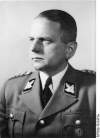
Otto Ohlendorf, one of the most notorious SS officials in Nazi Germany, was captured and interrogated extensively after the war. Although much of the U.S. Army's investigative file on Ohlendorf was declassified in 1987, some documents were withheld and are being released under the Nazi War Crimes Disclosure Act. They primarily illuminate corrupt practices by Nazi officials and Heinrich Himmler's behavior at the very end of the war. The new material, which is of value to historians, was held back because it contained foreign government information.
Born in Berlin in 1907, Ohlendorf joined the SA in 1925 and the SS in 1926. In 1936 he joined the SD as an economic adviser and from 1939 to 1945 he served as the chief of the Reich Security Main Office's Amt III, which studied the results of government measures on the German population. Ohlendorf is best known however, for his role as the Chief of Einsatzgruppe D, one of four mobile killing units that followed the German Army during the invasion of the USSR. Ohlendorf's unit was responsible for the southern Ukraine including the Crimea, and was responsible for the killing of 90,000 individuals from June 1941 to March 1942.
Ohlendorf surrendered to British authorities on 23 May 1945 and testified at the Trial of the Major War Criminals later that year. In 1947, he was the chief defendant in one of the twelve subsequent Nuremberg trials held by the U.S. Army (Case No. 9, The Einsatzgruppen Case). He was sentenced to death, and in 1951, despite the American revision of many sentences, Ohlendorf was executed.
1965 Death: Edmondo Rossoni: Italian fascist. A renegade of Socialism, Rossoni joined Benito Mussolini's Fascist movement in 1921. Rossoni made himself famous on July 25, 1943, by voting against Mussolini's leadership inside the Grand Council (thus siding with the coup d'etat initiated by Dino Grandi). When Mussolini regained power in northern Italy, creating the Italian Social Republic, Rossoni was sentenced to death in absentia. After escaping to Canada, he returned to Italy in 1947 when his sentence had been commuted to life imprisonment.
1986 Waldheim elected Austrian president:

At the end of a controversial campaign marked by allegations that he had participated in Nazi atrocities during World War II, former United Nations Secretary-General Kurt Waldheim is elected president of Austria, a largely ceremonial post.
After the annexation of his country by Nazi Germany in 1938, Waldheim was conscripted into the Germany army and served on the Russian front until 1941, when he was wounded. Waldheim claimed that he spent the rest of the war studying law in Vienna, but in 1986 documents were discovered showing he had been a German army staff officer stationed in the Balkans from 1942 to 1945.
After World War II, Waldheim entered diplomatic service and was later appointed Austrian ambassador to France and Canada. When Austria entered the United Nations in 1958, Waldheim was a member of its first delegation. Appointed Austria's permanent representative in 1965, he joined his country's cabinet in 1968 as Austrian foreign minister. In 1971, he ran for the Austrian presidency but lost. However, that same year, he became U.N. secretary-general. In 1976, he was reelected, but in 1981 a third term was blocked by a Chinese veto. During his tenure as head of the U.N., he attempted, with little success, to end the Iran-Iraq War, the Sino-Vietnam War, and to gain the release of American hostages in Iran.
In 1986, he ran for Austrian president again, but the campaign was heavily tainted by reports that he had been an interpreter and intelligence officer for a German army unit that committed war crimes during World War II. The unit, stationed in the Balkans, engaged in brutal reprisals against Yugoslav partisans and civilians and deported most of the Jewish population of Salonika, Greece, to Nazi death camps. Waldheim admitted that, contrary to earlier statements he made about his past, he had indeed served in the Balkans during the war, but denied any involvement in war crimes. On June 8, 1986, he was elected Austrian president, or head of state. Waldheim was guilty in many people's eyes, and the United States banned him from entering the country in 1987. His tenure as Austrian president was marked by a period of international isolation, and he chose not to run for reelection in 1992. (History.com)
1973 Death: Emmy Goering: Hermann Goering's second wife (1935):
Considered by some the de facto First Lady of the Third Reich due to Hitler's bachelorhood (the role of Eva Braun as Hitler's companion was intensely private and confidential), Emmy Goering served as Hitler's hostess to many state functions prior to World War II. She was the subject of some malicious gossip and references in non-German languages, particularly those written by aristocratic journalists, for a lack of real elegance . . . .
As wife of one of the richest and most powerful men in Europe, Emmy Goering enjoyed a lavish lifestyle well into World War II. Her husband owned mansions and estates and castles in Austria, Germany, and Poland and was a major beneficiary of the Nazis confiscation of art and wealth from Jews and others deemed enemies by the Nazi regime . . . . As for her character, no evidence indicates that Emmy shared the Nazi party's malignant anti-Semitism. As a former thespian she had worked in a field that has long had a disproportionate number of [homosexual] and Jewish members and evidence exist that she used her influence with her husband to allow several friends and acquaintances from her theater days to escape the country or obtain official clearance. In one tragic case she used her position to allow a non-Jewish actress to join her Jewish husband in a concentration camp when not even Goering's influence could secure his release . . . . She was generally described as a pleasant woman of no particular political enthusiasm, neither intellectually brilliant nor lacking.
After the end of the war Emmy Goering was imprisoned several times, sometimes along with her young daughter, and was finally released for good in 1948. All property belonging to her husband and even her own jewelry was confiscated. By the time of her husband's death at Nuremberg she and her daughter had been reduced to living in a two room cottage with no running water or electricity and a woman whose gowns had once required multiple closets owned two dresses. Upon her release she was able to secure a small apartment in a new construction in the rebuilt city of Berlin. She remained there for the rest of her life. For most of her life she suffered from sciatica. She wrote an autobiography, ''An der Seite meines Mannes'' (1967), published in English as ''My Life with Goering'' in 1972 . . . .
1989 Bismarck: The wreck of the German ship, which was sunk in 1941 during World War II, is found 600 miles west of Brest, France.
1993 Death: Rene Bousquet: Police chief of Vichy, France during World War II, shot dead at his Paris home in the Avenue Raphael by a lone gunman.
After Mitterrand's election in the presidential election in 1981, Bousquet met him at the Elysee to "talk about politics." In 1986, as accusations cast on Bousquet started to grow more credible, he and Mitterrand stopped seeing each other. The parquet general de Paris closed the case by sending it to a Court which was no longer in existence. This stirred outrage; attorneys for the International Federation of Human Rights declared that there was a "political decision at the highest levels to prevent the Bousquet affair from developing." In 1989, Serge Klarsfeld and his Association des Fils et Filles des juifs de France, the National Federation of deportees and internees, Resistants and Patriots and the Ligue des droits de l'homme filled a complaint against Bousquet for Crime against humanity, for the deportation of 194 children. In 1991, Bousquet was indicted by Justice. On 8 June 1993, Bousquet was shot dead by Christian Didier, a few weeks before Bousquet's trial was to begin.
Edited by Levi Bookin (Copy editor)
levi.bookin@gmail.com



Click to join 3rdReichStudies



Disclaimer: This site includes diverse and controversial materials—such as excerpts from the writings of racists and anti-Semites—so that its readers can learn the nature and extent of hate and anti-Semitic discourse. It is our sincere belief that only the informed citizen can prevail over the ignorance of Racialist "thought." Far from approving these writings, this site condemns racism in all of its forms and manifestations.
Fair Use Notice: This site may contain copyrighted material the use of which has not always been specifically authorized by the copyright owner. We are making such material available in our efforts to advance understanding of historical, political, human rights, economic, democracy, scientific, environmental, and social justice issues, etc. We believe this constitutes a "fair use" of any such copyrighted material as provided for in section 107 of the US Copyright Law. In accordance with Title 17 U.S.C. Section 107, the material on this site is distributed without profit to those who have expressed a prior interest in receiving the included information for research and educational purposes. If you wish to use copyrighted material from this site for purposes of your own that go beyond 'fair use', you must obtain permission from the copyright owner.
Please Note: The list-owner and moderators of 3rdReichStudies are not responsible for, and do not necessarily approve of, the random ads placed on our pages by our web server. They are, unfortunately, the price one pays for a 'free' website.